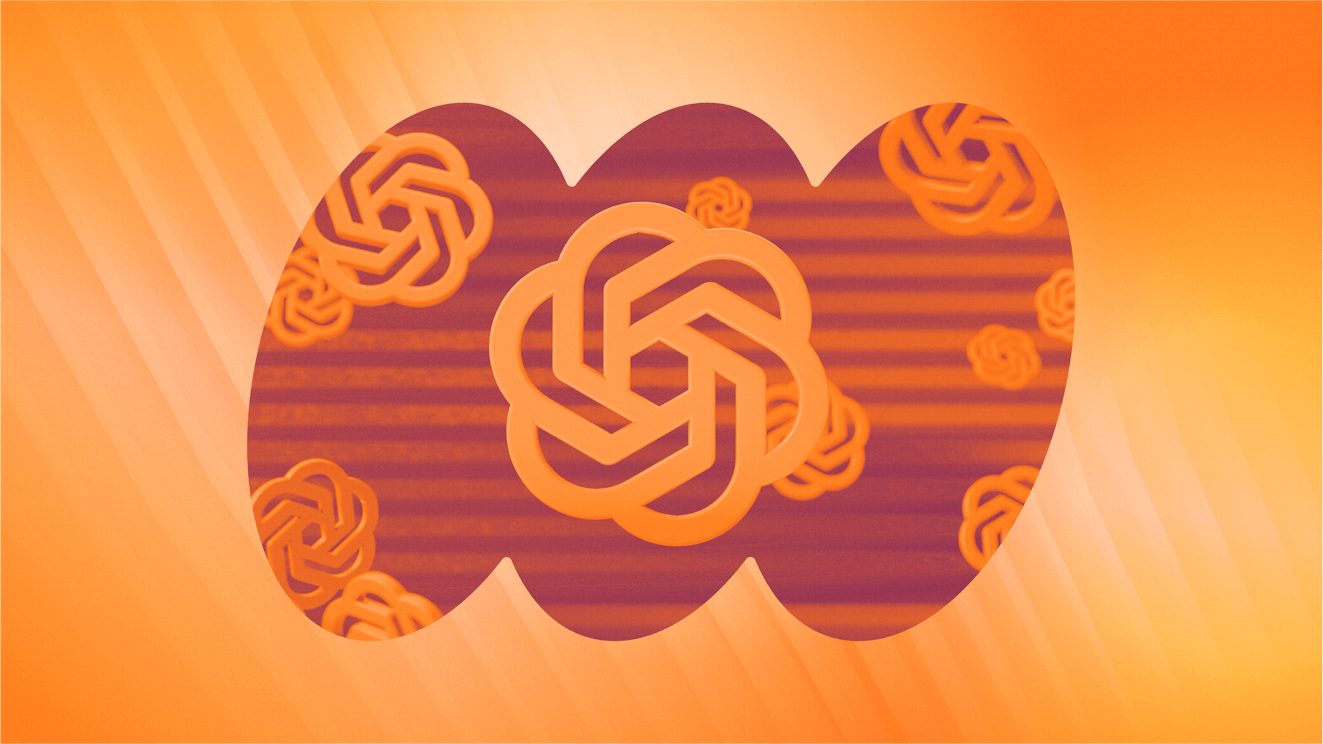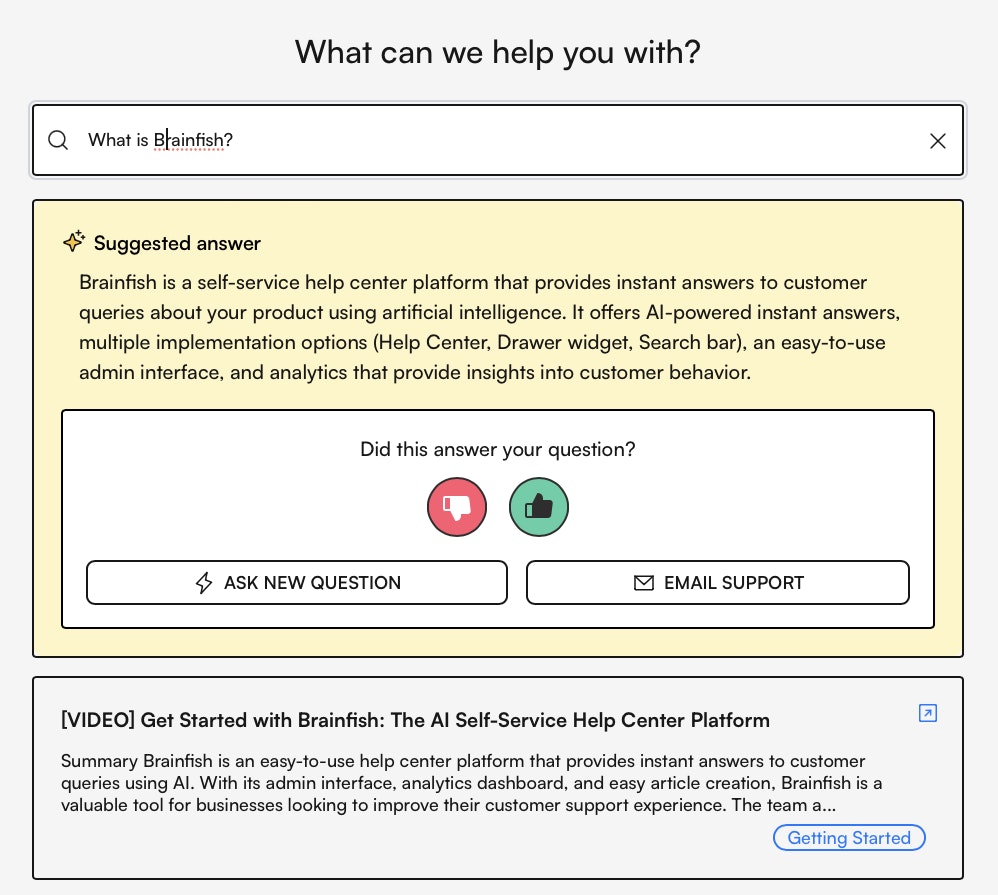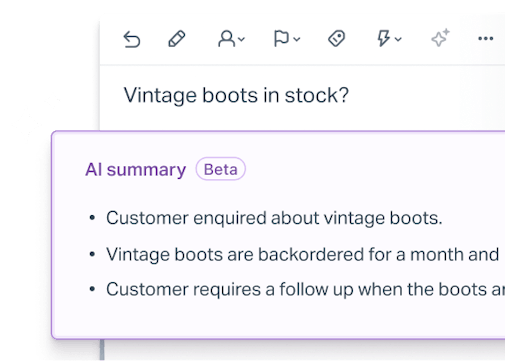Advancements in technology and the adoption of AI have rapidly changed the landscape of customer service. As businesses continue to prioritize providing a better customer experience, AI tools for customer service have emerged as essential solutions for delivering efficient and effective support.
In this article, we’ll explore some of the most promising AI customer support software available for 2024. If you want to improve your customer support operations or are considering implementing AI-based solutions, this list will enable you to make an informed decision.
This is a chapter in our Ultimate Guide to Using AI For Customer Support. When you're ready, check out the other chapters:
Webinar – Fears, Careers, Robot Peers: Help Scout Support Pros Talk AI
Chapter 1 – Help Scout’s AI Is at Your Service
Chapter 2 – We’ve Changed Our Minds About AI in Customer Service
Chapter 3 – Will AI-Powered Customer Service Replace Your Job?
Chapter 4 – Benefits of AI in Customer Service: 4 Ways AI Can Help
Chapter 5 – The AI-Enhanced Support Team of the Future
Chapter 6 – Using ChatGPT for Customer Service
Chapter 7 – 4 Diverse AI Chatbot Examples for Great Customer Service
Chapter 8 – Using AI for Email Writing: The 9 Best Tools
Chapter 9 – How AI Can Boost Help Desk Productivity (+ 7 Tools to Try)
Chapter 10 – AI Customer Support Software: 11 Best Tools for 2024
Chapter 11 – AI Knowledge Base: An Essential Guide
Chapter 12 – Leveraging AI in Ecommerce: Benefits, Tools, and Tips
What is AI customer service?
AI customer service is a method of supporting customers with minimal or reduced assistance from a company support team.
This is accomplished through the use of AI-powered customer service software that uses natural language processing (NLP), machine learning (ML), and generative AI to tackle tasks that don’t require the expertise and finesse of a human support agent. Having this extra help can improve customer experience as well as lighten agent workload.
How customer service teams use AI for customer support
AI tools automate repetitive, mundane tasks that might otherwise take up time and labor. With AI-powered chatbots and assistants, service teams can automate responses to frequently asked customer questions, offer personalized product recommendations, handle multiple customer conversations simultaneously, and operate 24/7 without exhaustion. This not only frees up time for service agents to tackle complex customer queries but also significantly reduces customer wait time.
Many AI tools are built with machine learning capabilities that adapt and improve over time. They learn from every customer interaction, evolving their understanding of issues and refining their problem-solving aptitude. As a result, AI tools can help you predict customer needs or problems even before they surface, transforming reactive customer support into a more proactive, anticipatory service.
These tools can also unlock relevant and deeply insightful data for customer service teams. Analyzing patterns and trends collected from thousands of customer interactions allows these teams to identify common issues, customers' preferred communication channels, peak support times, and more. These actionable insights pave the way for strategic decision-making that helps improve efficiency and elevate customer satisfaction.
AI also enhances personalization, an important trademark of modern customer experiences. AI tools have the capability to analyze customer behavior, history, and preferences to help your team offer much more tailored and relevant experiences. And when customers feel seen and understood by a brand, their loyalty naturally increases.
The benefits of AI in customer service
AI-powered tools will make a significant impact on the way customer service operates. Here are just a few of the benefits:
Decreased response times
A notable advantage of using AI for customer service is the increased speed of handling customer inquiries. AI tools reduce response times by automating routine processes, such as answering FAQs or processing simple tasks, through chatbots and AI assistants. As a result, customers receive immediate assistance, helping to boost customer satisfaction.
Improved accuracy
AI tools with smart language processing capabilities and machine learning enable improved accuracy in responding to customer inquiries. They can give customer support teams the information they need to provide precise, relevant responses through a better understanding of the context of a customer's inquiry and by drawing from an extensive knowledge base.
Additionally, as these AI systems learn from past interactions, they become more accurate and reliable over time. This improvement in accuracy reduces errors and contributes to seamless support experiences for customers.
Actionable insights
Data analysis is another significant benefit of AI tools in customer service. By processing large volumes of customer interactions and conducting detailed analyses, an AI solution can provide valuable insights into customer behavior, preferences, and trends. Customer service teams can leverage this data to anticipate customer needs, troubleshoot common issues more effectively, and stay attuned to customer demands.
Personalized experiences
AI tools excel at enhancing personalization in customer support by analyzing and understanding customer behavior, preferences, and histories. This understanding helps power personalized customer support interactions that address individual needs and respond more effectively to each customer's unique situation. By enabling support teams to provide more customized experiences, AI technology makes it possible to foster stronger customer relationships, boost loyalty, and ensure a positive brand perception.
Examples of AI in customer service
AI has a lot to offer when it comes to the way you deliver customer service, helping teams automate common inquiries, provide around-the-clock support, and free up time to focus on complex and personalized interactions. Here's a closer look at different types of AI-powered tools you can use to streamline customer service operations.
AI-powered chatbots
AI-powered chatbots are becoming increasingly common as a frontline customer support solution. They can learn from past interactions, use natural language processing and conversational AI to better converse with customers, and provide immediate responses to common customer queries. Using AI chatbots enables your business to:
Manage high volumes of requests without needing additional human resources.
Offer immediate responses to customers, reducing wait times and enhancing the customer service experience.
Focus on more complex tasks that require human intervention.
Automated tasks and workflows
With AI, routine tasks such as customer data entry and support ticket creation can be easily automated. By reducing the need for manual intervention, these tools can:
Decrease the risk of human error.
Improve customer service processes by making them faster and smoother.
Enhance the overall customer service experience.
Help manage customer service logistics, such as assigning tasks based on the complexity or nature of the problem.
AI-powered writing assistants
With the advent of better large language models (LLMs) like Open AI’s GPT-4, generative AI tools are now able to support the customer communication process. Using data like knowledge base articles and customer service tickets, AI-powered writing assistants can:
Modify the length and tone of existing copy.
Translate text to other languages, enabling multilingual support.
Draft responses to incoming customer communications that can be reviewed, modified, and sent by customer service agents.
AI-powered sentiment analysis
Two things AI is really good at are recognizing patterns and analyzing large amounts of data; it’s what helps it respond to routine questions based on past responses. That savvy for pattern recognition and data analysis also helps in another area: sentiment analysis. AI-powered customer sentiment analysis uses feedback at different points in the customer journey to uncover the variables that contribute to a positive or negative customer experience. It can help:
Quickly discover which customer issues are most common.
Give you insights that you can use to improve customer experience.
Make sense of otherwise disparate data.
Conversational knowledge bases
Another way to use AI in customer service are conversational knowledge bases. They’re similar in some ways to a chatbot but have some differences. A conversational knowledge base isn’t meant to feel like a human interaction. It’s meant to surface relevant knowledge base articles — or answers based on them — when a customer asks a question. Conversational knowledge bases help by:
Reducing incoming customer service requests.
Empowering customers to easily find answers on their own.
Conversational reporting
Though it’s easy to think about AI tools for customer support simply in terms of customer-facing capabilities, it can help with internal projects, too. One strong example of that is conversational reporting. With it, teams can use plain language to query AI to generate different reports in real time. Many tools can generate visual assets like graphs or provide summaries of the data with suggestions of things you can do to improve. These tools help teams by:
Reducing the time it takes to create and digest reports.
Allowing them to analyze customer data in new ways.
Making ad-hoc reporting more feasible.
Top AI tools for customer support
Every AI tool comes with unique capabilities intended to address the challenges you may face when delivering customer service. By understanding what's available, you can make an informed decision on which AI tool will best align with your customer service objectives.
Here are some customer service software platforms offering AI functionality to help you navigate through your choices.
Help Scout
Custify
Yuma AI Ticket Assistant
Freshdesk
Tidio
Qualaroo
HubSpot
Balto
Brainfish
Kustomer
Zendesk
1. Help Scout
Best customer service AI tool for human-centric customer interactions.
Help Scout is a communication platform that helps teams across an organization have better conversations with their customers. Taking customer interactions to the next level, we’ve introduced AI summarize, AI assist, and AI drafts to enhance the support experience for both customers and team members.
Reading through long email threads to understand the context of customer conversations can be cumbersome and inefficient. AI summarize enables you to spend less time getting caught up and more time providing high-quality support. With just one click, it offers concise summaries of email threads, enabling your team to quickly get up to speed on customer conversations.
Let's explore a few scenarios where AI summarize can enable your team members — both customer-facing and non — to provide even better support:
Team member, shift, or support channel changes: When customer conversations transfer between team members or across different support channels, this tool can help incoming support staff quickly understand what's already been discussed, ensuring seamless continuity.
Support escalation: When a situation demands escalation, AI summarize can give managers a brief and clear rundown of the issue's history, enabling them to make well-informed decisions promptly.
Quality assurance process: Teams conducting QA reviews can quickly get an overview of a conversation to help them identify areas of improvement or excellence.
Cross-departmental collaboration: Sometimes it's necessary to bring in individuals outside the immediate support team. The AI summarize tool allows for efficient catch-ups, regardless of one's familiarity with the support process.
Once your team is ready to respond, AI assist can help them polish their replies (or Docs articles), enabling better, faster service.

With AI assist, your team can:
Adjust tone: Use AI assist to modify replies to sound either friendlier or more professional, ensuring that responses stay consistent with your brand’s tone.
Adjust length: Expand short sentences into full replies or pare down wordy first drafts into succinct messages.
Check spelling and grammar: Check drafts for spelling and grammar errors.
Translate: Easily translate text into another language. Supported languages include Chinese, Dutch, English, Filipino, French, Korean, German, Indonesian, Italian, Japanese, Portuguese, Russian, Spanish, and Vietnamese.
Finally, based on customer conversations and knowledge base data, AI drafts automatically creates responses to incoming conversations. From there, your team can review, edit the message if necessary, and hit send.
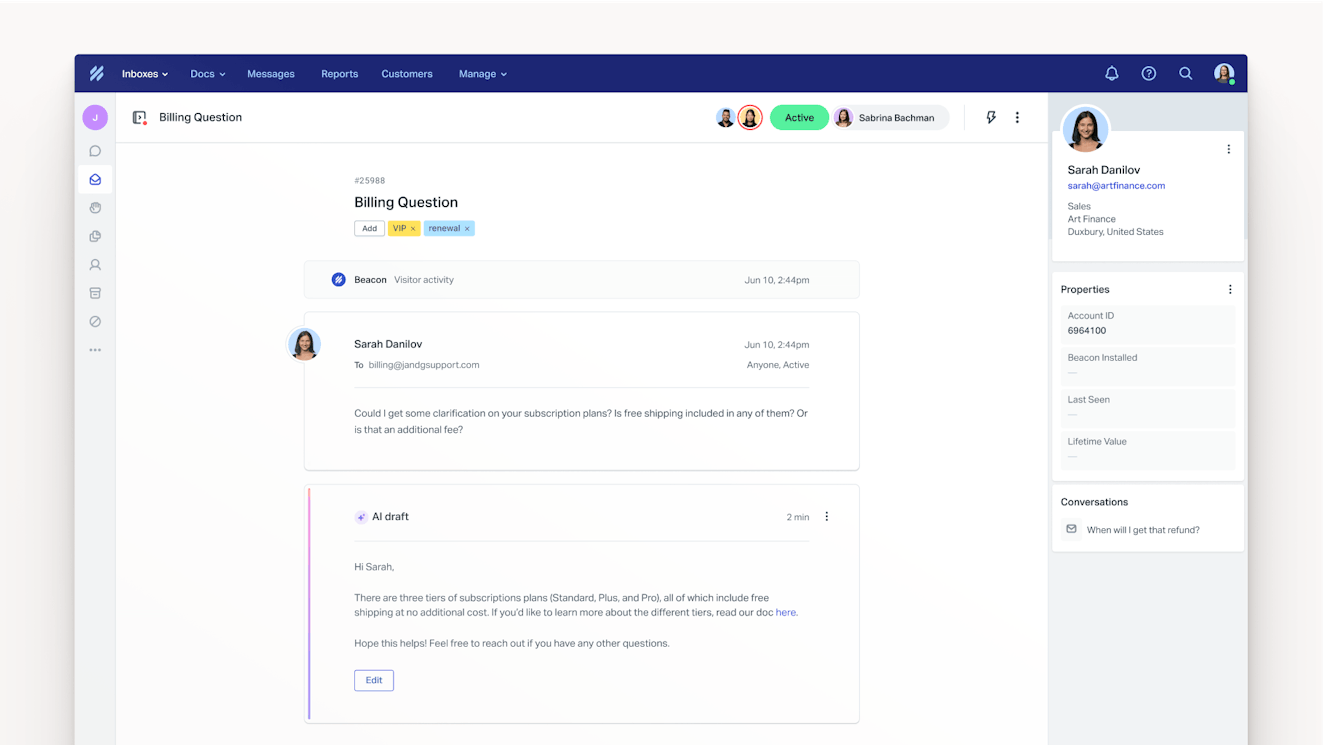
AI drafts lets you get a head start on every conversation, saving your team time and helping get your customers answers more quickly.
Price: Free trial available. Plans with AI features start at $40/user per month.
Try Help Scout free for 15 days:
2. Custify
Best customer service AI tool for understanding customer lifecycle.
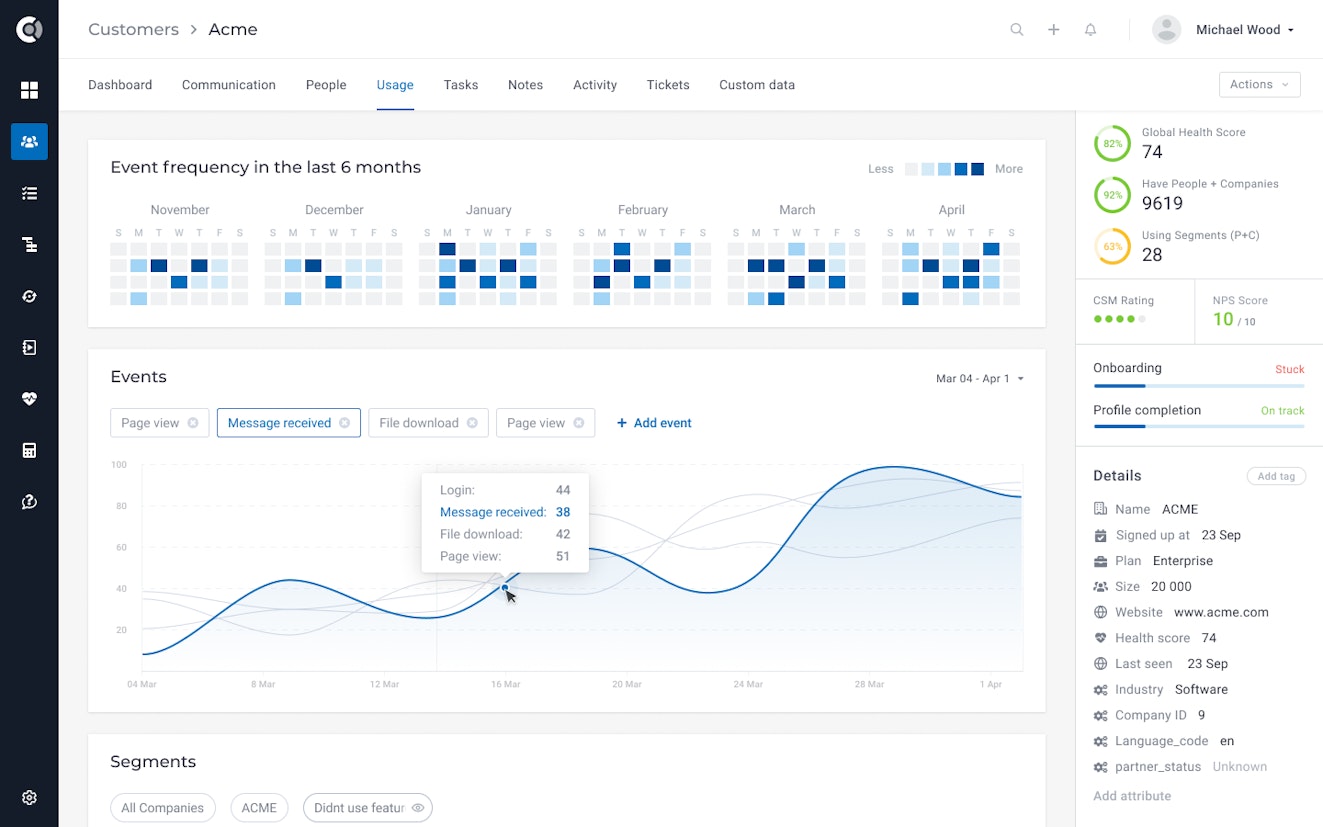
Custify is designed to assist customer success teams in leveraging customer interaction data for business growth. Predominantly geared toward SaaS companies, Custify consolidates all customer data into one place and provides actionable insights gathered from different systems.
The platform uses advanced techniques to process and analyze customer data, compiling massive amounts of data from different systems quickly and extracting significant insights about customer life cycle and satisfaction levels, upsell opportunities, and potential churn risks. It also uses automated tasks to cut back on time spent on manual tasks and allow customer success teams to spend more time interacting with customers.
Price: Pricing available upon request.
3. Yuma AI Ticket Assistant
Best customer service AI tool for managing high volumes of customer support requests.
Yuma AI Ticket Assistant is designed to streamline the customer support process by integrating directly with help desk software. The platform prioritizes efficient and effective handling of each customer inquiry, ensuring a smooth workflow for support agents.
When a customer submits a ticket, Yuma's AI immediately begins analyzing the inquiry and preparing the most suitable response. If the AI is confident in its response, it suggests a draft to the agent. If the response has low confidence, the system won’t send a draft or disrupt the agent's workflow.
Yuma also uses AI to understand your business. By learning the writing style from past tickets, the AI can draft responses that align with your brand's tone and language.
Other significant features include the tool's capability to automatically build a knowledge base for your brand, ensuring accurate and personalized responses, and its ability to provide a summary of your entire conversation thread with a customer. Yuma also directly integrates with your Shopify data, using live product information to guide customer interactions.
Price: Free trial available. Plans start at $239 per month.
4. Freshdesk
Best customer service AI tool for providing omnichannel support.
Freshdesk is a customer service software solution that empowers support teams with an array of tools and flexibility to meet customer service demands. From managing tickets and automating workflows to engaging with customers in real time, Freshdesk aims to streamline the customer service process. Plus, it offers service across popular messaging channels like WhatsApp, SMS, social media, and more.
At the heart of Freshdesk's AI-powered service is Freddy AI. Freddy AI uses machine learning to continuously learn from past tickets and resolutions, which helps it suggest appropriate responses to new customer queries, accelerating resolution times and improving consistency in the support agents' responses. Freddy AI also uses sentiment analysis to prioritize tickets automatically and classify them, which streamlines the ticket management process for the support teams.
Beyond enhancing agent productivity, Freshdesk's Freddy AI offers real-time engagement, providing customers with instant responses and support. It also features AI chatbots that can perform actions directly in the chat interface, like looking up order status, booking appointments, and more, providing self-service for common queries.
Price: Free trial and plan available. Paid plans start at $15/agent per month. AI features can be purchased as add-ons, though not all features are available across all plans.
5. Tidio
Best customer service AI tool for real-time customer interaction.
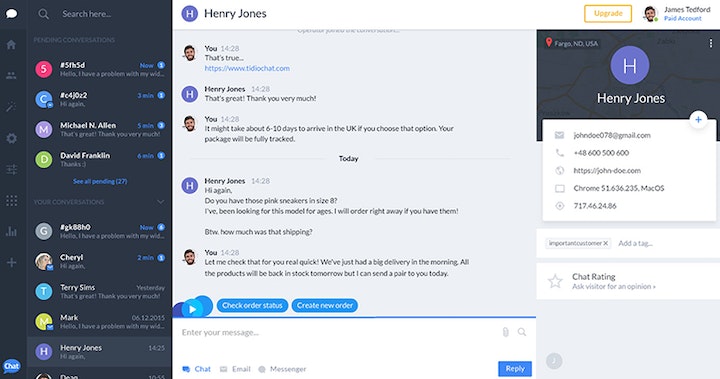
Tidio is a customer service software that combines live chat, chatbots, and email marketing to provide a well-rounded customer service solution. It’s designed to bridge the communication gap between businesses and their customers, providing real-time support and interaction.
Tidio’s customer service plans include a feature called Reply Assistant which helps agents enhance their copy before hitting send. The company also has a separate product, Lyro AI, which is essentially a virtual support agent. It is designed to interact and engage with customers as though a real person is talking to them, enhancing customer experiences and streamlining service processes.
Outside of Lyro, the company also offers a separate product for rule-based chatbots. If you want a bot experience but aren’t quite ready to commit to AI, the standard chatbot product might be a good option.
Price: Free trial and plan available. Paid customer service plans start at $29 per month, while Lyro AI Agent plans start at $39 per month.
6. Qualaroo
Best customer service AI tool for customer feedback.
Part of the ProProfs suite of products, Qualaroo is a platform focused on customer feedback. The software enables businesses to gather feedback on things like web, app, product, and even prototype experiences and provide insights that can help drive improvements.
While there are many tools that can help with targeted feedback collection, Qualaroo’s focus on being non-intrusive and polite is refreshing. The software learns your site to help improve response rates over time, and its question branching feature creates flows that help ensure that your customers are only ever exposed to questions that are relevant to them.
When it comes to AI, Qualaroo’s main offering is centered around its robust sentiment analysis feature. Powered by IBM Watson, the platform is able to sort through large amounts of data to identify keywords, as well as whether each piece of feedback is positive or negative. The software can also recognize emotion present in the text (joy, anger, disgust, sadness, fear, etc.). Each factor is given a related score, which can be used to trigger a response, such as creating a task for your team to follow up with a customer who has left an angry response.
Price: Free trial and plan available. Paid plans start at $19.99 for 100 responses per month.
7. HubSpot
Best customer service AI tool for centralizing marketing, sales, and customer service.
HubSpot is a comprehensive customer relationship management (CRM) platform that provides software, integrations, and resources for managing customer relationships across your business.
The platform offers AI-powered chatbots, which can handle customer queries around the clock, providing instant support and freeing up time for human agents. These chatbots are capable of learning from past interactions to provide tailored responses that enhance the customer experience. Additionally, AI assistance in the ticketing system ensures that customer issues are directed to the most suitable team or agent, based on the nature of the inquiry.
HubSpot also employs AI-backed automation to create a knowledge base from existing content, helping customers find answers to common questions on their own, and the AI technology works in analyzing customer feedback, using sentiment analysis to uncover patterns and trends in customer satisfaction.
Price: Free trial and plan available. Contact HubSpot for more information on pricing for AI-enhanced plans.
8. Balto
Best customer service AI tool for real-time call guidance in customer support call centers.
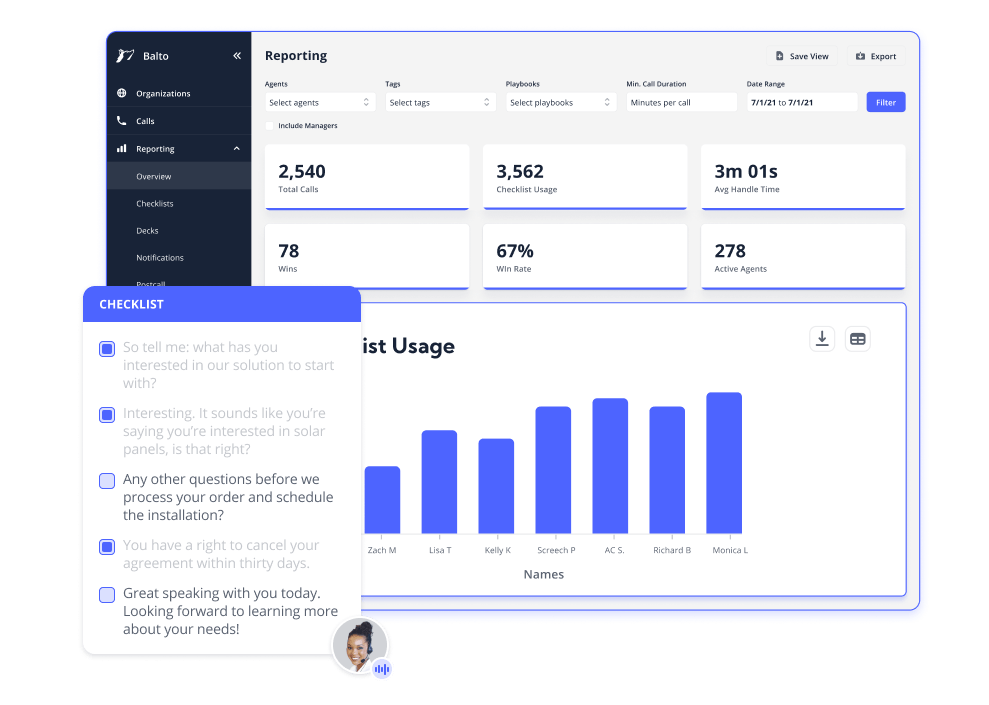
Balto is an AI-powered customer service tool that provides real-time guidance to contact center agents. The platform sends alerts to managers whenever there are coaching opportunities, allowing for real-time interventions. This strategy can promote immediate improvement in performance and enhance the overall call quality and customer satisfaction.
Another one of Balto's interesting features is the Real-Time Notetaker which uses artificial intelligence to automatically transcribe calls in real time. This frees agents from taking notes during critical customer interactions and highlights key information that could impact the conversation.
Price: Pricing available upon request.
9. Brainfish
Best customer service AI tool for AI-powered knowledge base functionality.
Brainfish is an AI-powered help center platform that addresses customer inquiries quickly and accurately using your existing help articles.
AI in Brainfish is primarily achieved through natural language processing and machine learning algorithms. These technologies enable the platform to analyze customer queries and provide instant responses based on the context and intent of the question. Additionally, Brainfish is capable of handling complex inquiries and delivering personalized responses tailored to the wording of each question.
Brainfish integrates with popular help desk software and strives to reduce the time it takes to answer customer queries while increasing customer satisfaction and loyalty. Additionally, Brainfish's collaborative editor interface simplifies the process of building and interacting with your documentation, making it user friendly and easy to deploy.
Price: Plans start at $549 per month.
10. Kustomer
Best customer service AI tool for unified customer views across all channels.
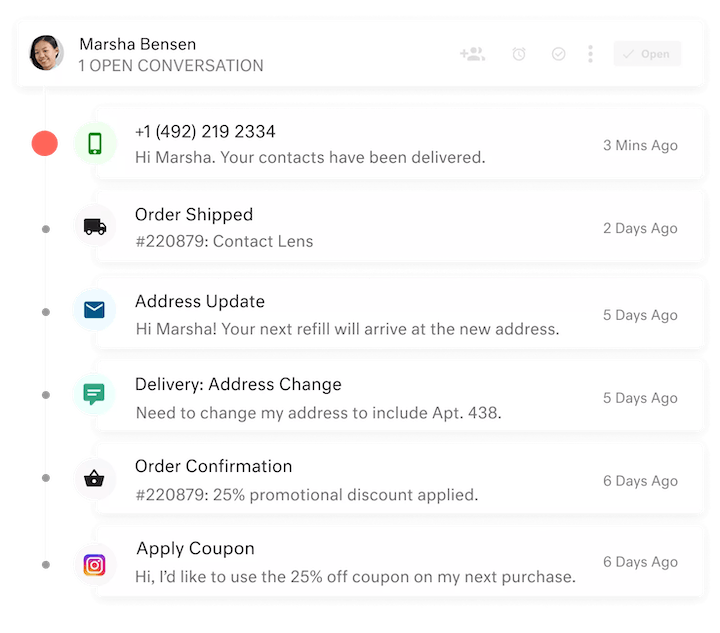
Kustomer is a customer service CRM platform that streamlines the customer journey by providing omnichannel messaging and a unified customer view. AI-driven automations are available as a usage-based add-on called Kustomer IQ, or KIQ.
The platform integrates AI in several ways to enhance overall efficiency and customer satisfaction. For instance, Kustomer's AI-driven approach enables proactive assistance, addressing customer needs before they ask for help, potentially reducing inbound support volume. Another key AI feature of Kustomer is its powerful multichannel bots that automate routine agent interactions, delivering personalized experiences and promoting faster resolutions.
Kustomer's AI capabilities extend to its unified customer view, providing agents with the information and context for making better and faster decisions. This eliminates the need for tab switching and duplicate tickets, enhancing agent productivity.
Price: Plans start at $89/user per month (eight seat minimum). KIQ is available as an add-on.
11. Zendesk
Best customer service AI tool for multichannel customer support.

Zendesk is a popular customer service platform that aims to centralize all service interactions and customer history in one unified interface, making it easier for support teams to track, prioritize, and solve customer inquiries seamlessly and efficiently.
The platform leverages AI to identify and categorize customer queries, routing them to the appropriate agent or department. This ensures efficiency in handling inquiries and prevents agents from spending time on tasks that could be handled by AI automation.
Additionally, Zendesk’s Answer Bot leverages machine learning to deliver instant and precise answers sourced from your knowledge base, community forums, and other help resources. This accelerates response times, freeing up customer service agents to handle more complex inquiries. The platform's AI capabilities extend to predictive analytics, offering insights into customer experiences and satisfaction and powering proactive customer engagement strategies.
Price: Free trial available. Plans including the features above start at $115/agent per month and the Advanced AI add-on is priced at $50/agent per month.
Challenges to implementing AI customer support software
There’s certainly a lot of upside to adding AI capabilities for your customer support team. However, that doesn’t mean there aren’t still challenges associated with implementing AI in customer service. Here are a few to be aware of before you get started:
Initial setup: AI is a very powerful tool out of the-box. That said, the LLMs powering AI generally won’t have product and company-specific information built in — you have to train it. Training AI generally requires some amount of technical resources to connect the LLM to your data source. It also often requires someone to monitor and rate initial outputs to guide the AI further.
Training the team: Getting people up to speed on the different features and functions of a new tool can be tough, especially when they still have their regular workload to consider. Make sure you set aside dedicated time for training. You could even consider having an agent on your team do more in-depth training to serve as the subject matter expert in case others have questions later.
Resistance to change: Once agents are trained and the AI is functioning, you might think that your team is ready to go. However, there are still challenges to face. Your team probably has a certain way of working, and utilizing the new AI tools represents a change to that process, which can be difficult. In addition, they may have concerns over displacement, which can also create friction.
In the end, implementing AI comes down to arming both your tool and your team with the right knowledge and support so that AI can become a natural part of your support strategy.
Best practices for getting started with AI-powered customer service
Implementing AI tools in customer service can greatly enhance the efficiency and effectiveness of your support team. Here's how you can successfully introduce AI capabilities into your business.
Assess your needs and goals
Before selecting an AI tool, you'll want to evaluate your business needs and desired outcomes. Here are some key questions to consider:
What specific customer service tasks and challenges do you want to address by implementing AI?
What are your goals for AI-enhanced customer support?
How will you measure success (e.g., improved customer satisfaction, increased support team efficiency, or reduced response time)?
By answering these questions, you'll gain a clear understanding of your objectives and the criteria to look for in an AI tool.
Choose the right platform for you
As you saw in the previous section, there are quite a few AI tools for customer service available on the market, each varying in functionality and use cases. To choose the one that best fits your needs, consider the following factors:
Features: Evaluate each tool's capabilities and how they align with your goals. Some features you may be interested in include AI-driven chatbots, automated ticket routing, or sentiment analysis.
Integration: Ensure the AI tool integrates seamlessly with your existing customer service software or exists natively within the software you're planning to use. This will enable a smoother transition and allow for improved collaboration.
Scalability: Opt for a solution that can scale as you grow. The tool should be able to accommodate the increasing demands of your customers and customer service team.
Cost: Compare the costs of different AI tools, including subscription fees, setup fees, and any other additional expenses. Choose the one that provides the best value for your budget.
Customer support and training: Look for platforms that offer comprehensive customer support and training options so you can quickly troubleshoot issues and maximize the tool's effectiveness.
Customer needs: The AI tool you choose should align with your company’s support philosophy. Different tools focus on different goals like making the customer journey easier, more affordable, or faster.
Integrate the tool into your existing processes
Once you've chosen your ideal AI tool, the next step is incorporating the software into your existing workflows. Here are some strategies to consider:
Gradual deployment: Start by implementing the AI tool for specific tasks, gradually expanding its use to other areas of customer support. This will allow your team to become familiar with the technology and minimize process disruptions.
Training: Ensure your customer service team is trained in using the AI tool effectively. Identify educational resources, offer hands-on practice, and provide ongoing support to help them embrace the new technology.
Monitoring performance: Regularly review the AI tool's performance to ensure it meets your expectations. Keep track of key metrics aligned with your goals, and make any necessary adjustments to improve results.
Feedback: Encourage your customer support team and customers to share their experiences with your AI tool through feedback and microsurveys. These insights can help refine its functionality and contribute to the tool's continuous improvement.
By following these guidelines, your business will be well-equipped to successfully implement an AI tool and reap the benefits it offers in customer service support.
The future of AI in customer service
The future of AI in customer service looks promising. With advancements in AI technology, we can expect more efficient automation, more accurate prediction of customer behavior, and more personalized and proactive customer experiences.
Help Scout is a strong contender when it comes to customer service tools that prioritize team efficiency and customer satisfaction. Our AI capabilities enable your support teams to address customer issues more effectively and with greater ease, giving them more time to focus on what truly matters: the customer.
Sign up for a free trial of Help Scout today, and find out if we’re the right fit for you, your business, and your customers.


